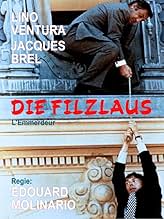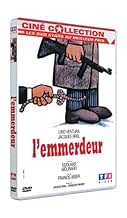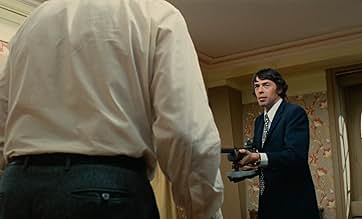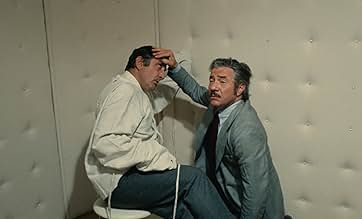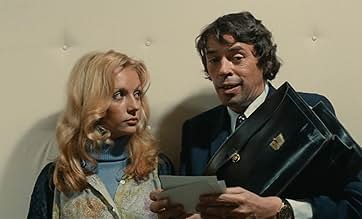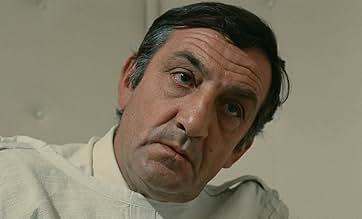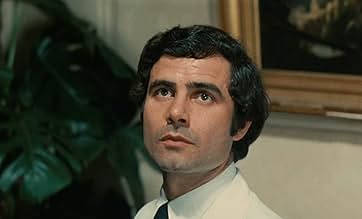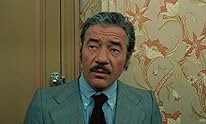L'emmerdeur
- 1973
- Tous publics
- 1h 20m
IMDb RATING
7.1/10
3.9K
YOUR RATING
Milan must kill Louis Randoni before he testifies in a court of law. He is disturbed by his depressed roommate François Pignon who commits suicide by hanging himself from the toilet pipe flo... Read allMilan must kill Louis Randoni before he testifies in a court of law. He is disturbed by his depressed roommate François Pignon who commits suicide by hanging himself from the toilet pipe flooding Milan's room. Here he is stuck in problems.Milan must kill Louis Randoni before he testifies in a court of law. He is disturbed by his depressed roommate François Pignon who commits suicide by hanging himself from the toilet pipe flooding Milan's room. Here he is stuck in problems.
Liza Braconnier
- Madame Randoni
- (uncredited)
Pierre Forget
- Félix
- (uncredited)
Robert Galligani
- L'employé de réception
- (uncredited)
Featured reviews
Professional hitman Ralf Milan checks into a hotel overlooking a court of law and all he wants is to be left in peace to assassinate a key witness but unbenownst to him there is an amiable idiot named Francois Pignon in the next apartment who is unsuccessfully trying to hang himself........
Written by Francis Véber and directed by Edouard Molinaro whose collaboration was to strike gold with 'La Cage aux Folles', this bizarre opus is a hugely entertaining blend of deadpan humour and laugh-out-loud visual gags and is an absolute must for those who like their comedies 'black'(apologies to the wokerati)
In his second of three films for this director, the casting of Lino Ventura as Milan is a masterstroke for in what at first appears to be a crime thriller he is merely sending up his well established tough guy/mobster image, so much so that his gradual disintegration as his plans are thrown into disarray by the terminally irritating Pignon is wondrous to behold. Ventura is a revelation in this and proves that comedy is at its most effective when played 'straight'.
Belgian singer/songwriter and sometimes actor Jacques Brel, in what was to be his final film, is the first to portray Pignon who has since been reincarnated by Jacques Villaret, Pierre Richard, Patrick Timsit in Véber's own badly received remake and last but not least Daniel Auteuil.
Véber's 'odd coupling' evidently appealed to Billy Wilder but his makeover 'Buddy, Buddy' featuring Messrs. Matthau and Lemmon is, for this viewer at any rate, a huge disappointment.
Written by Francis Véber and directed by Edouard Molinaro whose collaboration was to strike gold with 'La Cage aux Folles', this bizarre opus is a hugely entertaining blend of deadpan humour and laugh-out-loud visual gags and is an absolute must for those who like their comedies 'black'(apologies to the wokerati)
In his second of three films for this director, the casting of Lino Ventura as Milan is a masterstroke for in what at first appears to be a crime thriller he is merely sending up his well established tough guy/mobster image, so much so that his gradual disintegration as his plans are thrown into disarray by the terminally irritating Pignon is wondrous to behold. Ventura is a revelation in this and proves that comedy is at its most effective when played 'straight'.
Belgian singer/songwriter and sometimes actor Jacques Brel, in what was to be his final film, is the first to portray Pignon who has since been reincarnated by Jacques Villaret, Pierre Richard, Patrick Timsit in Véber's own badly received remake and last but not least Daniel Auteuil.
Véber's 'odd coupling' evidently appealed to Billy Wilder but his makeover 'Buddy, Buddy' featuring Messrs. Matthau and Lemmon is, for this viewer at any rate, a huge disappointment.
What a gem is 'L'emmerdeur' (distributed in the Anglophone market as 'A Pain in the Ass'), the 85-minute film made in 1973 by Édouard Molinaro. It is a 'noir' comedy that catches Lino Ventura at the peak of his popularity built mostly on 'tough guy' roles - either gangsters or policemen - and gives the popular singer Jacques Brel the opportunity of his last big screen role (the tenth in only six years of activity as an actor). Both actors discover and use their comic resources to the maximum, in a genre different than the ones audiences know them in, bringing to screen a script full of verve and action written by Francis Veber (based on his own theater play), who would try with much less success a 'remake', 35 years later, in his last film as a director.
The story, which takes place in Montpellier, combines marital melodrama with film noir with paid assassins as heroes. Milan is sent to eliminate a witness who is going to reveal the truth about a gangster network at a trial. He rents a room at a hotel overlooking the entrance of the courthouse where the future victim will get out of the car at 2:00 p.m. His bad luck is that in the adjoing room has just checked-in François Pignon, a traveling salesman who tries in vain to arrange a meeting with his wife who left him for her psychiatrist. The desperate Pignon's suicide attempt may disrupt the assassin's plans, attracting the attention of the police, who are already on alert. Milan must try to convince Pignon not to kill himself and at the same time fulfill his mission. It won't be easy.
The impossible combination of Ventura - Brel works perfectly, to the delight of the spectators. It can be said that Ventura is playing a gangster role as he has played in many other films, but this time he is put in situations where he is very very unlucky. Brel borrows mime and comic gags from beloved comedy actors of the period. Veber's screenplay is written in such a way that the events happen almost in real time. It is one of the post-Nouvelle Vague influences, the other being the free use of the mobile camera, which takes us into hotel rooms, high up on railings and cornices outside the hotel, or in super-fast car chases, as the hero must be at the scene of the future crime at 2:00 p.m., as I said. Cinematographer Raoul Coutard had already worked with Truffaut, Godard and Costa-Gavras. The result of their collaboration is a film that uses in a professional manner the techniques of the cinematographic avant-garde to create a quality 'crowd-pleaser' that passes well the test of half a century that has elapsed since its release.
The story, which takes place in Montpellier, combines marital melodrama with film noir with paid assassins as heroes. Milan is sent to eliminate a witness who is going to reveal the truth about a gangster network at a trial. He rents a room at a hotel overlooking the entrance of the courthouse where the future victim will get out of the car at 2:00 p.m. His bad luck is that in the adjoing room has just checked-in François Pignon, a traveling salesman who tries in vain to arrange a meeting with his wife who left him for her psychiatrist. The desperate Pignon's suicide attempt may disrupt the assassin's plans, attracting the attention of the police, who are already on alert. Milan must try to convince Pignon not to kill himself and at the same time fulfill his mission. It won't be easy.
The impossible combination of Ventura - Brel works perfectly, to the delight of the spectators. It can be said that Ventura is playing a gangster role as he has played in many other films, but this time he is put in situations where he is very very unlucky. Brel borrows mime and comic gags from beloved comedy actors of the period. Veber's screenplay is written in such a way that the events happen almost in real time. It is one of the post-Nouvelle Vague influences, the other being the free use of the mobile camera, which takes us into hotel rooms, high up on railings and cornices outside the hotel, or in super-fast car chases, as the hero must be at the scene of the future crime at 2:00 p.m., as I said. Cinematographer Raoul Coutard had already worked with Truffaut, Godard and Costa-Gavras. The result of their collaboration is a film that uses in a professional manner the techniques of the cinematographic avant-garde to create a quality 'crowd-pleaser' that passes well the test of half a century that has elapsed since its release.
This is one of those films that is so funny, it makes you (well me anyway) smile just to remember it.
The essential storyline is of a professional hitman and a guy that he finds he can not get rid of. (The English translation of the title is pain-in-the-behind.)
This is black comedy done to perfection with a brilliant gradual build-up. It starts straight-faced so, if you do not know what you are watching, it could be any old thriller. Gradually the gags come in until it reaches a manic pace.
The two stars are the completely deadpan Lino Ventura and the songwriter Jacques Brel.
It is sadly under-rated and hard-to-find. Seek it out!
The essential storyline is of a professional hitman and a guy that he finds he can not get rid of. (The English translation of the title is pain-in-the-behind.)
This is black comedy done to perfection with a brilliant gradual build-up. It starts straight-faced so, if you do not know what you are watching, it could be any old thriller. Gradually the gags come in until it reaches a manic pace.
The two stars are the completely deadpan Lino Ventura and the songwriter Jacques Brel.
It is sadly under-rated and hard-to-find. Seek it out!
One of the many great comedies from France from the 1970's, and a commodity which is seriously lacking nowadays in that country ! It is now available in France ( March 2007 ) on DVD, and please note that the DVD has English Subtitles if required. Ventura was a great actor and Brel, though hopeless as an actor, occupied a part which didn't need a great actor. Brel in this film can get on your nerves at time, just like Michael Crawford in "Some Mothers Do 'Ave 'Em" but despite this, the spectator has a good time ! The catchy, almost wailing, theme music by François Rauber (played on a whiny accordeon) is typical of many French films from the sixties and seventies and serves as a way of identifying the origin of the film. Given that now both the main protagonists of the film are dead, the sound of this accordéon is particularly nostalgic. The recipe of two character-opposed central characters is often a central tenet of French cinema ( Richard / Depardieu, Depardieu/Reno, De Funes/Carmet, De Funes/Bourvil ...... and Ventura/Brel in this film )and has been used with success to make generations of moviegoers laugh ! Francis Veber had a large had in this film although its director was Edouard Molinaro - is it any surprise then that one of the characters has the name François Pignon. Indeed, BREL is the ORIGINAL François Pignon. The character was subsequently interpreted by Pierre Richard, Jacques Villeret, Daniel Auteuil et alia ............
This is one of the last good comedies Molinaro was able to make, before he got stuck in Cage aux folles-robotic entertainment. Pairing Lino Ventura and Jacques Brel was a wonderful idea: one is so dour and methodical, the other so emotional, helpless, a real loser.
The hotel scenes are very well set up; there is a claustrophobic feeling about the layout of the suites. The water seeping through the door into Ventura's suite from Brel's bathroom after the suicide attempt prevents Ventura from concentrating on assembling his rifle--very well handled by Molinaro. The clinic scene, with Ventura ending up in a strait-jacket is a marvelous four-way comic piece with Caroline Cellier and Jean-Pierre Darras joining the two principals.
Now, if someone will bring back La Mandarine (with an impressive Annie Girardot) and L'Homme pressé, two more great Molinaro pictures from the 70's, my happiness will be complete.
The hotel scenes are very well set up; there is a claustrophobic feeling about the layout of the suites. The water seeping through the door into Ventura's suite from Brel's bathroom after the suicide attempt prevents Ventura from concentrating on assembling his rifle--very well handled by Molinaro. The clinic scene, with Ventura ending up in a strait-jacket is a marvelous four-way comic piece with Caroline Cellier and Jean-Pierre Darras joining the two principals.
Now, if someone will bring back La Mandarine (with an impressive Annie Girardot) and L'Homme pressé, two more great Molinaro pictures from the 70's, my happiness will be complete.
Did you know
- TriviaThe Director, Edouard Molinaro plays the barman of the coffee shop. And there's a moment that he's got a vinyl disc of Jacques Brel in his hands.
- GoofsA door is blocked with a chair under the handle. Unfortunately no one of the movie crew noticed or seems to have bothered that the door opens the other way.
- ConnectionsFeatured in Francis Veber artisan du rire: La saga Pignon (2001)
- How long is A Pain in the Ass?Powered by Alexa
Details
- Release date
- Countries of origin
- Languages
- Also known as
- A Pain in the Ass
- Filming locations
- Montpellier, Hérault, France(on location)
- Production companies
- See more company credits at IMDbPro
- Runtime1 hour 20 minutes
- Sound mix
- Aspect ratio
- 1.66 : 1
Contribute to this page
Suggest an edit or add missing content


